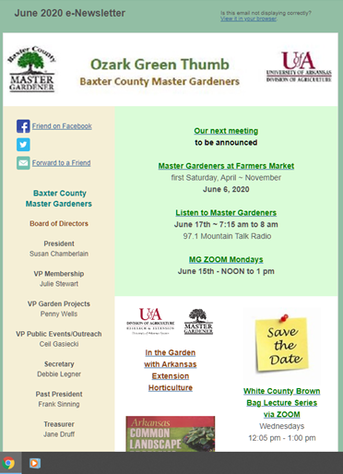|
Ozark Green Thumb BCMG Monthly e-Newsletter |
|
|
 The Baxter County Cooperative Extension Service will host a teleconference (Zoom) Master Gardener Training for new members that will be held at our office on five consecutive Wednesdays in September (2nd, 9th, 16th, 23rd & 30th). The classes will be held in Mountain Home with the exact location still TBD and will be dependent upon state health department COVID-19 guidelines at that time. Each day’s sessions will run from 8:00 a.m. to approximately 4:30 p.m. with a break for lunch. Topics include basic botany, soils, fertilizers, pest control, fruits, vegetables, ornamentals, and lawns. University of Arkansas Extension Service specialists, county agents, and others teach the classes. We cover a lot of stuff in those 5 days! This training is for those persons who wish to become a Master Gardener volunteer. For more information on what that entails, give us a call! The application should be completed and returned to our office with your payment by Friday, July 31, 2020. The cost of the training is $100, which includes the Master Gardener notebook, all training materials, first year's dues, and a name badge. If you have questions or know of others who are interested, or need an application, please contact me at 870-425-2335 or [email protected]. Applications can be picked up at the office at 3 East 9th St. in Mountain Home or can be emailed to applicants. Follow the Baxter County Master Gardeners on Facebook at: Baxter County Master Gardeners For more information about the Arkansas Master Gardener program, check us out https://www.uaex.edu/yard-garden/master-gardeners/ If you prefer a stay at home, self-paced, online training, more information will be provided later this year.
0 Comments
Here’s the checklist for things to be on the lookout for as we get deeper into summer.
For more information on any of the above topics, please feel free to contact the University of Arkansas Division Of Agriculture Cooperative Extension Service at 870-425-2335. |
Archives
April 2022
|
|

